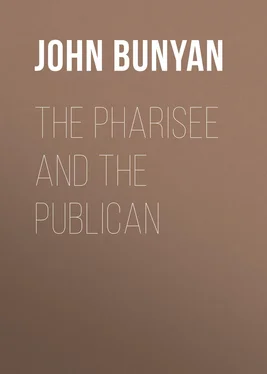John Bunyan - The Pharisee and the Publican
Здесь есть возможность читать онлайн «John Bunyan - The Pharisee and the Publican» — ознакомительный отрывок электронной книги совершенно бесплатно, а после прочтения отрывка купить полную версию. В некоторых случаях можно слушать аудио, скачать через торрент в формате fb2 и присутствует краткое содержание. Жанр: foreign_prose, foreign_religion, Философия, foreign_psychology, foreign_antique, на английском языке. Описание произведения, (предисловие) а так же отзывы посетителей доступны на портале библиотеки ЛибКат.
- Название:The Pharisee and the Publican
- Автор:
- Жанр:
- Год:неизвестен
- ISBN:нет данных
- Рейтинг книги:4 / 5. Голосов: 1
-
Избранное:Добавить в избранное
- Отзывы:
-
Ваша оценка:
- 80
- 1
- 2
- 3
- 4
- 5
The Pharisee and the Publican: краткое содержание, описание и аннотация
Предлагаем к чтению аннотацию, описание, краткое содержание или предисловие (зависит от того, что написал сам автор книги «The Pharisee and the Publican»). Если вы не нашли необходимую информацию о книге — напишите в комментариях, мы постараемся отыскать её.
The Pharisee and the Publican — читать онлайн ознакомительный отрывок
Ниже представлен текст книги, разбитый по страницам. Система сохранения места последней прочитанной страницы, позволяет с удобством читать онлайн бесплатно книгу «The Pharisee and the Publican», без необходимости каждый раз заново искать на чём Вы остановились. Поставьте закладку, и сможете в любой момент перейти на страницу, на которой закончили чтение.
Интервал:
Закладка:
1. His negative holiness was not universal.
2. His positive holiness was rather ceremonial than moral.
1. His negative holiness was not universal. He saith indeed, he was not an extortioner, nor unjust, no adulterer, nor yet as this Publican: but none of these expressions apart, nor all, if put together, do prove him to be perfect as to negative holiness; that is, they do not prove him, should it be granted, that he was as holy with this kind of holiness, as himself of himself had testified. For,
(1.) What though he was no extortioner, he might yet be a covetous man; Luke xvi. 14.
(2.) What though, as to dealing, he was not unjust to others, yet he wanted honesty to do justice to his own soul; Luke xvi. 15.
(3.) What though he was free from the act of adultery, he might yet be made guilty by an adulterous eye, against which the Pharisee did not watch (Matt. v. 28), of which the Pharisee did not take cognizance.
(4.) What though he was not like the Publican, yet he was like, yea was, a downright hypocrite; he wanted in those things wherein he boasted himself, sincerity; but without sincerity no action can be good, or accounted of God as righteous. The Pharisee, therefore, notwithstanding his boast, was deficient in his righteousness, though he would fain have shrouded it under the right definition thereof.
(5.) Nor doth his positive holiness help him at all, forasmuch as it is grounded mostly, if not altogether, in ceremonial holiness: nay, I will recollect myself, it was grounded partly in ceremonial and partly in superstitious holiness, if there be such a thing as superstitious holiness in the world; this paying of tithes was ceremonial, such as came in and went out with the typical priesthood. But what is that to positive holiness, when it was but a small pittance by the by. Had the Pharisee argued plainly and honestly; I mean, had he so dealt with that law, by which now he sought to be justified, he should have brought forth positive righteousness in morals, and should have said and proved it too, that as he was no wicked man with reference to the act of wickedness, he was indeed a righteous man in acts of moral virtues. He should, I say, have proved himself a true lover of God, no superstitious one, but a sincere worshipper of him; for this is contained in the first table (Exod. xx.), and is so in sum expounded by the Lord Christ himself (Mark xii. 30). He should also, in the next place, have proved himself truly kind, compassionate, liberal, and full of love and charity to his neighbour; for that is the sum of the second table, as our Lord doth expound it, saying, “Thou shalt love thy neighbour as thyself;” Mark xii. 31.
True, he says, he did them no hurt; but did he do them good? To do no hurt, is one thing; and to do good, is another; and it is possible for a man to do neither hurt nor good to his neighbour. What then, is he a righteous man because he hath done him no hurt? No, verily; unless, to his power, he hath also done him good.
It is therefore a very fallacious and deceitful arguing of the Pharisee, thus to speak before God in his prayers: I am righteous, because I have not hurt my neighbour, and because I have acted in ceremonial duties. Nor will that help him at all to say, he gave tithes of all that he possessed. It had been more modest to say, that he had paid them; for they, being commanded, were a due debt; nor could they go before God for a free gift, because, by the commandment, they were made a payment; but proud men and hypocrites love so to word it both with God and man, as at least to imply, that they are more forward to do, than God’s command is to require them to do.
The second part of his positive holiness was superstitious; for God had appointed no such set fasts, neither more nor less but just twice a-week: “I fast twice a-week.” Ay, but who did command thee to do so, other than by thy being put upon it by a superstitious and erroneous conscience, doth not, nor canst thou make to appear. This part, therefore, of this positive righteousness, was positive superstition, and abuse of God’s law, and a gratification of thy own erroneous conscience. Hitherto, therefore, thou art defective in thy so seemingly brave and glorious righteousness.
Yet this let me say, in commendation of the Pharisee, in my conscience he was better than many of our English Christians; for many of them are so far off from being at all partakers of positive righteousness, that neither all their ministers, Bibles, and good books, good sermons, nor yet God’s judgments, can persuade them to become so much as negatively holy, that is, to leave off evil.
The second thing that I take notice of in this prayer of the Pharisee, is his manner of delivery, as he stood praying in the temple: “God, I thank thee,” said he, “that I am not as other men are.” He seemed to be at this time in more than an ordinary frame, while now he stood in the presence of the divine Majesty: for a prayer made up of praise, is a prayer made up of the highest order, and is most like the way of them that are now in a state beyond prayer. Praise is the work of heaven; but we see here, that an hypocrite may get into that vein, even while an hypocrite, and while on earth below. Nor do I think that this prayer of his was a premeditated stinted form, but a prayer extempore , made on a sudden according to what he felt, thought, or understood of himself.
Here therefore we may see, that even prayer, as well as other acts of religious worship, may be performed in great hypocrisy; although I think, that to perform prayer in hypocrisy, is one of the most daring sins that are committed by the sons of men. For by prayer, above all duties, is our most direct and immediate personal approach into the presence of God; as there is an uttering of things before him, especially a giving to him of thanks for things received, or a begging that such and such things might be bestowed upon me. But now, to do these things in hypocrisy (and it is easy to do them so, when we go up into the temple to pray), must needs be intolerable wickedness, and it argueth infinite patience in God, that he should let such as do so arise alive from their knees, or that he should suffer them to go away from the place where they stand, without some token or mark of his wrath upon them.
I also observe, that this extempore prayer of the Pharisee was performed by himself, or in the strength of his own natural parts; for so the text implieth. “The Pharisee,” saith the text, “stood and prayed thus with himself,” or “by himself,” and may signify, either that he spoke softly, or that he made this prayer by reason of his natural parts. “I will pray with the Spirit,” said Paul; 1 Cor. xiv. 15. “The Pharisee prayed with himself,” said Christ. It is at this day wonderfully common for men to pray extempore also; to pray by a book, by a premeditated set form, is now out of fashion. He is counted nobody now, that cannot at any time, at a minute’s warning, make a prayer of half an hour long. I am not against extempore prayer, for I believe it to be the best kind of praying; but yet I am jealous, that there are a great many such prayers made, especially in pulpits and public meetings, without the breathing of the Holy Ghost in them; for if a Pharisee of old could do so, why not a Pharisee do the same now? Wit and reason, and notion, are not screwed up to a very great height; nor do men want words, or fancies, or pride, to make them do this thing. Great is the formality of religion this day, and little the power thereof. Now, where there is a great form, and little power (and such there was among the Jews, in the time of our Lord and Saviour Jesus Christ), there men are most strangely under the temptation to be hypocrites; for nothing doth so properly and directly oppose hypocrisy, as the power and glory of the things we profess. And so, on the contrary, nothing is a greater temptation to hypocrisy, than a form of knowledge of things without the savour thereof. Nor can much of the power and savour of the things of the gospel be seen at this day upon professors (I speak not now of all), if their notions and conversations be compared together. How proud, how covetous, how like the world in garb and guise, in words and actions, are most of the great professors of this our day! But when they come to divine worship, especially to pray, by their words and carriage there, one would almost judge them to be angels in heaven. But such things must be done in hypocrisy, as also the Pharisee’s was.
Читать дальшеИнтервал:
Закладка:
Похожие книги на «The Pharisee and the Publican»
Представляем Вашему вниманию похожие книги на «The Pharisee and the Publican» списком для выбора. Мы отобрали схожую по названию и смыслу литературу в надежде предоставить читателям больше вариантов отыскать новые, интересные, ещё непрочитанные произведения.
Обсуждение, отзывы о книге «The Pharisee and the Publican» и просто собственные мнения читателей. Оставьте ваши комментарии, напишите, что Вы думаете о произведении, его смысле или главных героях. Укажите что конкретно понравилось, а что нет, и почему Вы так считаете.












